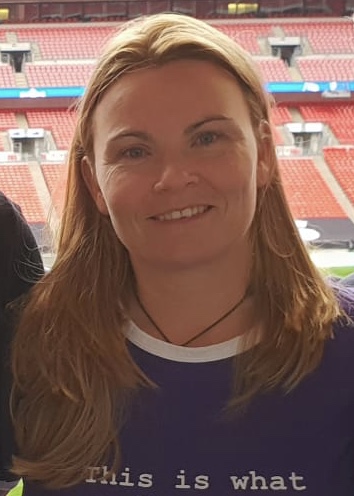This post is part of the Countdown to Conference (C2C) series. We would love to feature a brief blog post from you too! Visit our main Countdown to Conference page for details! For more information about #GEAConf2019 visit the conference website
C2C: ‘I don’t think my sexuality would come into it at all’: Understanding Australian LGBT trainee teachers’ expectations
Dr Kate Russell, University of East Anglia
Twitter: @DrKRussell
I find it hard to identify myself as a researcher at times; I have a Psychology degree, a PhD in Sport Psychology and publications in body image research, child protection, teacher training, and the sociology of gender and sexuality in sport and education contexts. I have taught in Psychology, Sports Science, teacher training, and Education departments and shared my love and interest for all of these things wherever I have been.
My PhD in Sport Psychology looked at the participation motivation of female rugby players, netballers and cricketers. I focused on how body satisfaction influenced their identity within the sport and how the functionality of their bodies (as related to the ability to complete the requirements of their sport) factored heavily in this. I also found that body satisfaction was transient; many of the women who were initially positive about their body shape and size on their field of play, were often very negative about their bodies once they were in a social context. The frame of their judgements shifting from a performance oriented to a presentation mode that created a tension for them. Identity and gender have always been central tenets for me in my work.
In 2007, I emigrated to Australia to start a new life and to begin work as a teacher educator on a Health and Physical Education undergraduate training course. While I continued to research gender representations in elite sport there, I also began a new research focus on trainee teachers. I have been influenced heavily by the work of Tanja Ferfolja and Kerry Robinson in relation to the role of gender and sexual diversity training for trainee teachers in helping support their work with future pupils. Along with researchers like Harris and Gray, they have also focused on LGBTQ+ qualified teachers experiences in schools and the difficulties that many have faced but I was keen to focus more on the trainee experience. I was intrigued about the development of teacher identity and how/if sexual and gender diversity might influence ongoing thoughts about how to be a teacher.
My project (that I am presenting on at the conference), examined the experiences of 12 LGBT identified trainee teachers through their courses but also about what their hopes were for a teaching future. I was keen to explore if they felt that their gender and/or sexual diversity would/could/should influence the type of teacher they saw themselves becoming and how they would negotiate this in the heteronormative school climate. In New South Wales, where I was located, there is an exemption to anti-discrimination laws that means that religious schools can claim the right to refuse to hire, or to fire, an employee on the basis of their sexuality or gender identity and I wanted to know how LGBTQ+ trainees saw that. Faith based schools proliferate the Australian school system and was a destination of choice for many trainees – including those who identified as LGBTQ+. I have employed Janet Alsup’s Borderland discourse, as well as post-structural readings of the trainees stories to help frame the tensions identified; how they sought to negotiate the professional with the personal in a space where heteronormative dynamics take prominence and how difficult decisions needed to be made about where to teach in the future, what to hide, and how to live an open life. I argue that teacher training institutions need to do more to bring sexual and gender diversity into their classrooms to encourage (difficult) conversations about gender and sexual diversity, trainee teacher identity development and future aspirations. When some teacher educators espouse the mantra that teachers should keep the ‘professional and personal separate’, this feels very problematic or naïve at best. LGBTQ+ trainee teachers do not and will not live or work in a vacuum and these trainee stories show that there needs to be an open discussion about this as we train the next generation of teachers.
If you are attending conference, let us know on Twitter using the hashtag: #GEAconf2019


